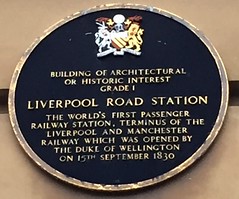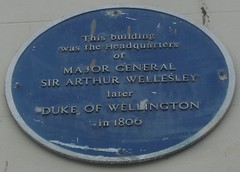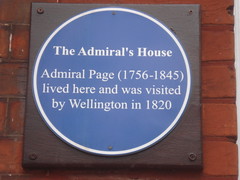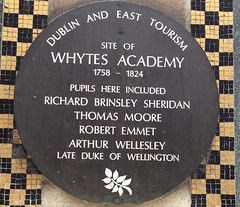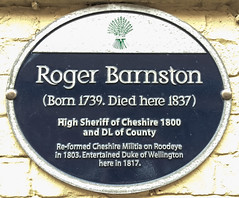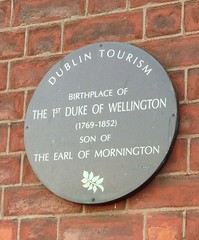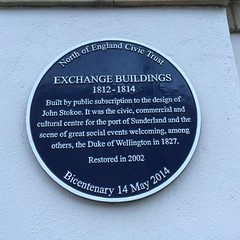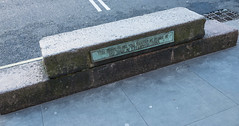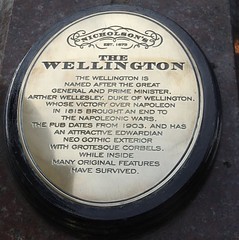Field-Marshal Duke Arthur Wellesley


Field-Marshal Duke Arthur Wellesley
(1769-1852)
Knight of the Order of St Patrick (until 1852), Knight Grand Cross of the Royal Guelphic Order (until 1852), Fellow of the Royal Society (until 1852), British Army Major General (1802-1808), 1st Viscount Wellington (1809-1852), Privy Counsellor (1812-1852), Field-Marshal (from 1813), 640th Knight of the Order of the Garter (1813-1852), 1st Duke of Wellington (from 1814), 24th Prime Minister of the United Kingdom (1828-1803), and 27th Prime Minister of the United Kingdom (1834-1834)
Family tree
Commemorated on 14 plaques
Liverpool Road Station. The world's first passenger railway station, terminus of the Liverpool and Manchester Railway, which was opened by the Duke of Wellington on 15th September 1830.
Liverpool Road, Manchester, United Kingdom where they opened
This building was the Headquarters of Major General Sir Arthur Wellesley later Duke of Wellington in 1806
54 High Street, Hastings, United Kingdom where they was headquartered
The Admiral's House. Admiral Page (1765-1845) lived here and was visited by Wellington in 1820
13 Tower Street, Ipswich, United Kingdom where they visited (1819)
Viscount Arthur Wellesley KG KP GCH PC FRS 1769-1852 1st Duke of Wellington and Prime Minister 1834 stayed here during the Napoleonic Wars 1803-1815
1 Chatham Place, Ramsgate, United Kingdom where they stayed
Site of Whytes Academy 1758 - 1824 Pupils here included Richard Brinsley Sheridan Thomas Moore Robert Emmet Arthur Wellesley Late Duke of Wellington.
78 - 79 Grafton St (Bewleys), Dublin, Ireland where they attended school
Roger Barnston (Born 1739. Died here 1837) High Sheriff of Cheshire 1800 and DL of County. Re-formed Cheshire Militia on Roodeye in 1803. Entertained Duke of Wellington here in 1817.
The Forest House, Love Street, Chester, United Kingdom where they was entertained
Park House. Built as a private residence in 1715. Park House became the fashionable Albion Hotel in the early 19th Century. The Duke of Wellington stayed here in 1820. The hotel, with large pleasure gardens behind closed in 1865, since when the building has had many different uses.
37 Lower Bridge Street, Chester, United Kingdom where they stayed (1820)
Birthplace of the 1st Duke of Wellington (1769-1852) Son of the Earl of Mornington
24 Merrion St Upper, Dublin, Ireland where they was born (1769)
Stephenson's Railway Station The Liverpool - Manchester line of the station was opened in 1830 by the Duke of Wellington, famous for his victory at Waterloo
Vicarage Grove, Eccles, United Kingdom where they was
Exchange Buildings. 1812-1814 Built by public subscription to the design of John Stokoe. It was the civic, commercial and cultural centre for the port of Sunderland and the scene of great social events welcoming, among others, the Duke of Wellington in 1827. Restored in 2002. Bicentenary 14 May 2014.
, Sunderland, United Kingdom where they visited (1827)
This Horse Block was erected by desire of the Duke of Wellington. 1830
Waterloo Place, London, United Kingdom where they was
The Wellington The Wellington is named after the Great General and Prime Minister. Arther Wellesley. Duke of Wellington. Whose victory over Napoleon in 1815 brought an end to the napoleonic wars. The pub dates from 1903. and has an attractive Edwardian neo gothic exterior with grotesque corbels. while inside many original features have survived.
The Strand, London, United Kingdom where they was
The Wellington. Formerly the New Inn - renamed after a visit by The Duke of Wellington 1769-1852
The Wellington, 33 Steyne Rd, Seaford, United Kingdom where they visited
The Waterloo Way Broadstairs On Sunday 18th June 1815 the Anglo-Dutch army under the command of the Duke of Wellington and the Prussian army led by Field Marshal Gebhard Leberecht von Blücher defeated Napoleon Bonaparte's army at the Battle of Waterloo eight miles south of Brussels in Belgium. This victory was a defining moment in European history. The official dispatch with the news of the victory was carried to England by The Honourable Major Henry Percy, 14th Light Dragoons, an aide de camp to the Duke of Wellington. He travelled by post chaise from Brussels to Ostend where he joined His Majesty's Ship Peruvian, under the command of Commander James White, Royal Navy, which then sailed for England. Landing at Broadstairs on 20th June, Major Percy and Commander White left immediately for London by post chaise. Broadstairs | Sarre | Canterbury | Faversham | Sittingbourne | Rochester | Dartford Grosvenor Square St James's Square Unveiled By Councillor Rosalind Binks, Mayor Of Broadstairs And St. Peter's On 20 June 2015 To inaugurate The Waterloo Way from Brussels to London in honour of all those who fought at Waterloo.
Eagle House, The Parade, Broadstairs, United Kingdom where they was

